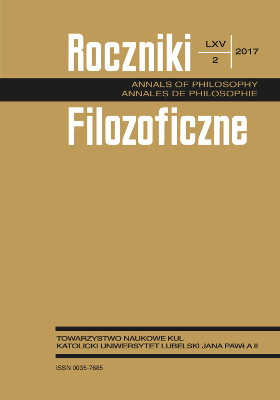The Principle of Reason according to Leibniz: The Origins, Main Assumptions and Forms
The Principle of Reason according to Leibniz: The Origins, Main Assumptions and Forms
Author(s): Bogusław PaźSubject(s): Philosophy, History of Philosophy, Early Modern Philosophy
Published by: Towarzystwo Naukowe KUL & Katolicki Uniwersytet Lubelski Jana Pawła II
Keywords: the principle of reason; reason (ratio); sufficiency; determination; rendering
Summary/Abstract: The subject of this article is Leibnizian interpretation of the principle of reason. Although the German philosopher called it principium grande of his philosophy, we do not find its systematic exposition in Leibniz’s works. The main aim of my paper is to present a short exposition of the principle. The article consists of three parts: in the first I present systematic exposition of the principle of reason with particular emphasis on explication of terms “principle” and “reason,” in the second, I show the origins of the principle, finally, in the third part, I discuss in detail three forms of it: the principle of sufficient reason, the principle of determining reason and the principle of rendering reason. I accept two main theses: firstly, a proper interpretation of this principle requires taking into account the whole context of Leibnizian philosophy, i.e. one cannot limit oneself (as it is usually happens among researchers) to only one discipline, e.g. logic. Secondly, the ultimate methodological and heuristical foundation of the principle of reason is Leibnizian metaphysics, especially natural theology.
Journal: Roczniki Filozoficzne
- Issue Year: 65/2017
- Issue No: 2
- Page Range: 111-143
- Page Count: 33
- Language: English

